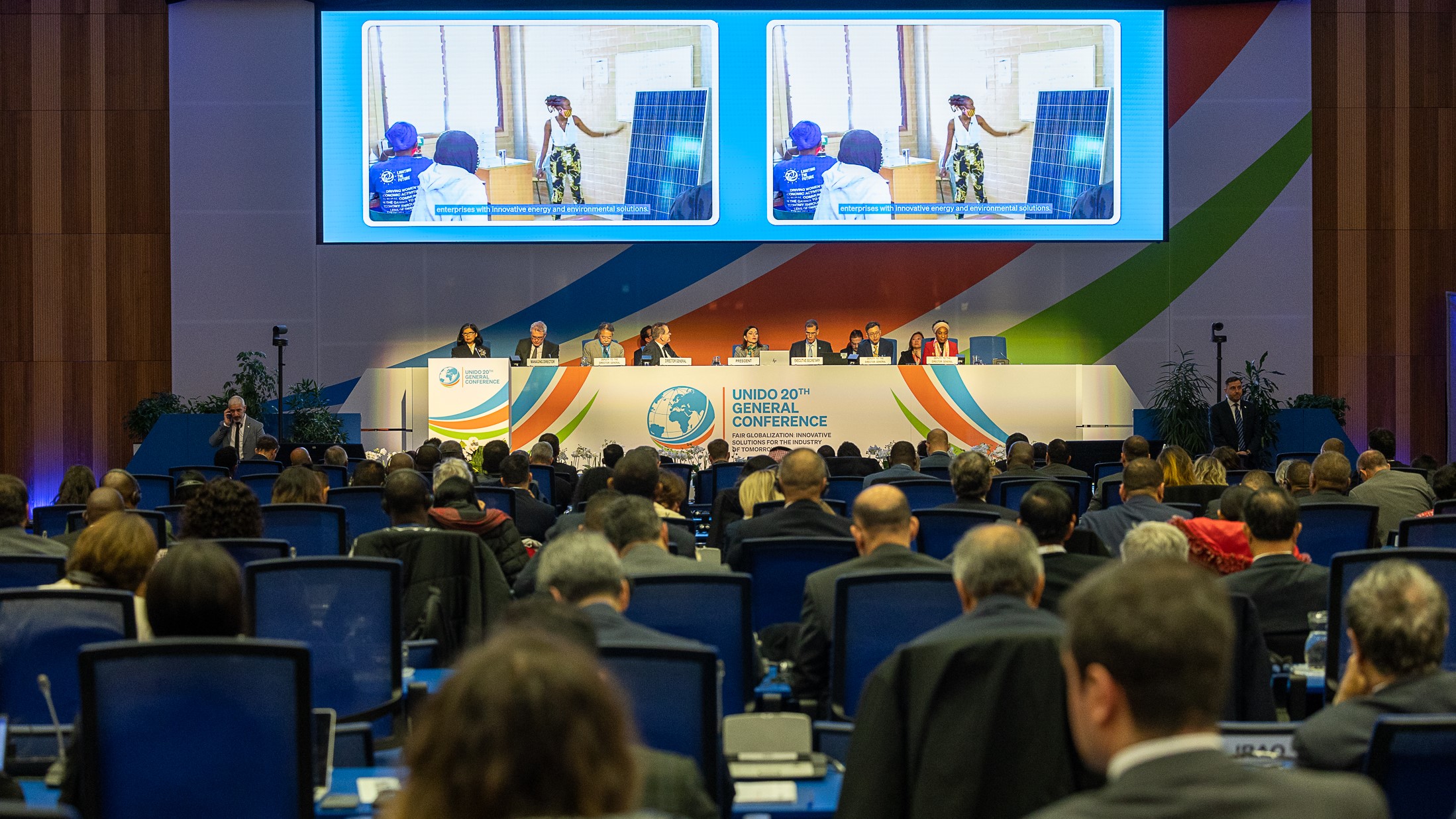

After hard work and spirited debates, 20th UNIDO General Conference comes to an end
01 December 2023

The 20th session of the General Conference of UNIDO with the theme, “Fair Globalization: Innovative Solutions for the Industry of Tomorrow", has concluded after five days, during which representatives of Member State and other guests explored new pathways to sustainability, digital inclusivity and economic resilience. Discussions and debates focused on how inclusive and sustainable industrial development can support sustainable supply chains, limit climate breakdown and contribute to ending hunger worldwide.
UNIDO Director General Gerd Müller’s opening speech set the tone with a call for more global solidarity. “We need to rethink the global economy. We need new rules for globalization – to foster fairer globalization with development opportunities for all. The industrialized countries must fulfill their promises and commitments.”
Subsequently, an array of global leaders took the floor, both physically and virtually. In his speech, Ethiopia's Prime Minister Abiy Ahmed highlighted the potential of inclusive and sustainable industrialization in creating shared global prosperity.

Paula Narváez, President of the UN ECOSOC, emphasized the role of sustainable industrialization in economic growth, while Dennis Francis, President of the UN General Assembly, commended UNIDO for delivering on knowledge sharing, technology transfer, and capacity building.
The Prime Minister of Barbados, Mia Mottley, underscored UNIDO’s crucial role in addressing global challenges and amplifying the voices of smaller nations.



The first of a series of debates and discussions, the Industrial Innovation Forum, convened high-level speakers from governments, industry, academia and financial institutions. Together, they identified tangible solutions to shared challenges, including food system transformation, fostering sustainable supply chains, and addressing the threats posed by climate change.
A discussion on the green hydrogen transition made clear the potential to reshape the global energy landscape. It highlighted the environmental benefits as well as the challenges involved, pointing out the need to significantly scale-up green hydrogen production.
Gender equality and the empowerment of women are priorities at UNIDO, and the gender event highlighted industry's role, exploring government, private sector, and stakeholder contributions. It showcased women as agents of change and included the presentation of UNIDO's Gender Equality Mobilization Award.
Experts and delegates gathered for a panel discussion on responsible mining, focusing on the need for sustainability and innovation in the critical minerals field. Speakers advocated for a global alliance supporting responsible mining practices.
Industrialization in middle-income countries was also put under the spotlight, with government ministers from across the globe emphasizing the obstacles to inclusive and sustainable development, and sharing examples of effective national policies, initiatives and practices that advance industrialization.
A panel discussion on green industrialization and sustainable value chains for low-carbon technologies accentuated how the Global South can reduce reliance on imports and have more domestic value addition through local manufacturing.
Digitalization and innovation have a key role to play in enabling sustainable development. An event addressing digital divides discussed emerging artificial intelligence technologies, ethical implications, and the evolving regulatory policies.
The General Conference saw a high-level debate prompted by the key findings of UNIDO’s flagship publication: the Industrial Development Report. The Report presents model solutions for developing countries, such as supply chain development in the green minerals sector, skills development for local digital solutions to improve advanced manufacturing, and strategically fortifying trade infrastructure to attract Foreign Direct Investment.


Throughout the five days, Solutions Talks at the Vienna International Centre Rotunda offered a platform for presentations by UNIDO and its partners from academia and the private sector, showcasing the use of frontier technologies and applied methodologies for sustainable development.
In addition to the talks, debates, meetings and discussions, a physical and virtual exhibition displayed UNIDO’s work in its priority fields and in the various regions of the world, while an evening cultural event brought together UNIDO staff and conference delegates.
The General Conference saw a strong participation of stakeholders from governments, academia, the private sector and knowledge-based institutions. Five hundred and ninety-two delegates took part in the Conference, including 28 government ministers, and they were joined by representatives of 66 non-governmental organizations, UN agencies and private sector partners. All attended with one common goal: to discuss the path forward for a fairer globalization and prosperous future where all enjoy the benefits of sustainable industrial development.


In his closing speech, UNIDO Director General Gerd Müller said, “Our discussions here this week have made it clear what is needed: investments in infrastructure, sustainable energy systems, and food security, and investments in green technologies, digitalization, artificial intelligence, education, and the empowerment of women.”
Looking ahead to the COP28 in Dubai, Müller announced that “UNIDO will be focusing on stressing the need for investment in the expansion of renewable energy sources, and on promoting green hydrogen in developing countries and, above all, the least developed countries.”

